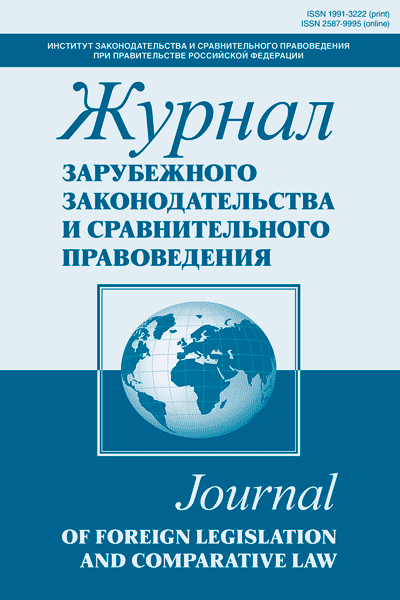This research paper explores the issue of legal and institutional framework for the protection of persons reporting corruption offenses in the public interest and to the state. This research is based on comparative legal analysis of the legislation in Russia and China. Authors explore ways of communication (internal and external), the creation of protective mechanisms that ensure safety of persons reporting corruption offenses, and measures to support them. Besides, this research is also aimed at searching solutions for establishing compensation mechanisms for such persons for the suffered material and health damage, which can result from reporting corruption offense.
Corruption, corruption offense, law enforcers, China, message about corruption, safety of informers, compensation mechanisms.
1. Huntington S. Political Order in Changing Societies. New Haven, 1998.
2. Johnston M. The Political Consequences of Corruption: Reassesment. Comparative Politics. 1986. July; URL: http://www.infousa.ru/laws/demdialogs_corrupt.htm.
3. Johnston M. Syndroms of Corruption. Wealth, Power, and Democracy. Cambridge, 2005.
4. Lambsdorff J. G. The Institutional Economics of Corruption and Reform. Theory, Evidence and Policy. Cambridge, 2007.
5. Leff N. H. Economic Development Through Bureaucratic Corruption. American Behavioral Scientist. 1964. Vol. 82. No. 2.
6. Montias J. M., Rose-Ackerman S. Corruption in a Soviet-type Economy: Theoretical Considerations.
7. Osterfeld D. Prosperity Versus Planning: How Government Stifles Economic Growth. N. Y., 1992.
8. Rosefielde S. Economic Welfare and the Economics of Soviet Socialism: Essays in Honor of Abraham Bergson. Cambridge, 1981.
9. Shleifer A., Vishney R. Pervasive Shortages under Socialism. Rand Journal of Economics. 1992.
10. The Political Economy of Corruption / eds. by A. Jain, K. Jain. L., 2001.
11. Wrage A. A. Bribery and Extortion: Undermining Business, Governments, and Security. Westport, 2007.
12. Dyurkgeym E. Norma i patologiya. Sotsiologiya prestupnosti. M., 1966.
13. Korruptsiya: priroda, proyavleniya, protivodeystvie / otv. red. T. Ya. Khabrieva. M., 2012.
14. Nauchno-pravovye problemy protivodeystviya korruptsii. Zhurnal zarubezhnogo zakonodatel´stva i sravnitel´nogo pravovedeniya. 2012. № 3.
15. Pravosudie v sovremennom mire / pod red. V. M. Lebedeva, T. Ya. Khabrievoy. M., 2012.
16. Rol´ predprinimatel´skikh struktur v protivodeystvii korruptsii: nauch.-prakt. posobie / A. V. Gabov, N. I. Gaydaenko Sher, I. V. Glazkova i dr.; otv. red. N. G. Semilyutina, E. I. Spektor. M., 2012.
17. Seval´nev V. V. Protivodeystvie korruptsii: opyt KNR. Zhurnal zarubezhnogo zakonodatel´stva i sravnitel´nogo pravovedeniya. 2014. № 1.
18. Spektor E. I., Seval´nev V. V., Matulis S. N. Zaprety i ogranicheniya v prave i korruptsiya. Zhurnal rossiyskogo prava. 2014. № 10.
19. Tantsi V. Ostorozhno: korruptsiya. Transition. Ekonomicheskiy vestnik perekhodnoy ekonomiki. 2004. № 2.
20. Khabrieva T. Ya. Korruptsiya i pravo: doktrinal´nye podkhody k postanovke problemy. Zhurnal rossiyskogo prava. 2012. № 6.
21. Khabrieva T. Ya. Nauchno-pravovye problemy protivodeystviya korruptsii. Zhurnal rossiyskogo prava. 2012. № 7.
22. Khantington S. Politicheskiy poryadok v menyayushchikhsya obshchestvakh. M., 2004.





